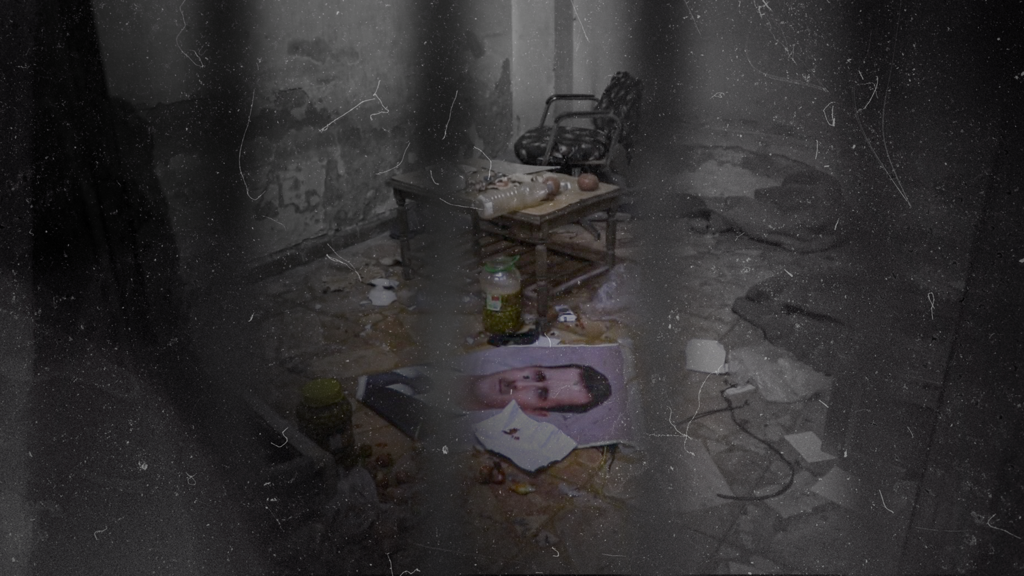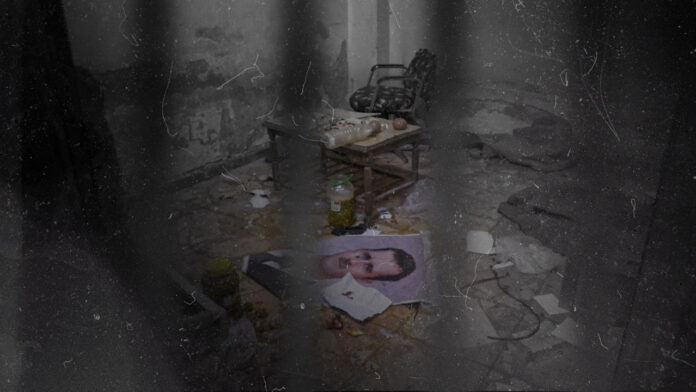
“The first rape was the worst. I remember every second of that first night. It lasted four hours.”
Asma was arrested in 2016 for delivering aid to the besieged population of Eastern Ghouta, an opposition stronghold suburb of Damascus. She was detained for a year in Bashar al-Assad‘s prisons. And repeatedly raped.
Asma was raped 13 times over 18 days. First by one officer, then by soldiers. Her ordeal at times included sexual penetration with objects. The violations, brutal, dehumanising and merciless, were all conducted in Branch 235, better known as the Palestine Branch (Far Falastin in Arabic), a prison run by Assad’s dreaded Military Intelligence Directorate. “I counted them like the number of steps in the Palestine Branch. It’s impossible to forget,” said the Syrian woman, who is now a refugee in Turkey.
Watch moreRape: Assad’s weapon against Syrian women
In 2011, when many Syrians rose up to challenge Assad’s stranglehold on power, the “Butcher of Damascus” unleashed a fearsome crackdown. The regime arrested and arbitrarily imprisoned men, women, and children, regardless of age or religion. A mere suspicion or denunciation could lead to imprisonment in the country’s prisons, the most feared of which were the security branches in the Damascus area. These detention centres were the scene of systematic torture and sexual violence.
Houda was “chosen” as soon as she arrived at the Palestine Branch. She was just 18 at the time. The teenage detainee was blindfolded and taken to a room. “I think there were three of them. One person would come in, another would leave. I could only hear their footsteps,” she said, recounting details of her four-month detention in 2015 in the Palestine Branch. “They said my body was ‘still clean’. I will never forget that word: clean,” she said with a shudder.
Her gang rape was brutal, and included anal and vaginal penetration. “I would have preferred to be tortured, beaten, hung on the wall. Anything but that. Torture is easier than rape.”
Yasmine was a 22-year-old virgin when she was arrested in 2015. “The rapist’s name was Nader. He wasn’t an officer,” she explained. “I was so scared that my legs were shaking. I couldn’t stop them.”
Nader was drunk and forced Yasmine to drink arak, a distilled alcohol popular in the Levant. Yasmine had never had alcohol before, but she had no choice. She was then raped. And then again and again during 25 days.
Her ordeal continued in another prison, Branch 215, nicknamed the “Branch of Death”, in the suburbs of the capital. The jailers sexually assaulted her in the archive room without blindfolding her. “They put my hands on the desk and a piece of sponge in my mouth. One soldier raped me and two others stood at the door to watch.”
Over the next three months, Yasmine was repeatedly raped. “I stopped counting. It was always in the same room,” she said. “I couldn’t feel anything anymore. I didn’t want to leave, I was praying for death. I wanted it to end.”
Read moreRape and torture in Assad’s prisons: Syrian women break their silence
Women as weapons of war
During the 13-year uprising against Assad’s Baathist regime, Syrian women found themselves on the frontline of the war, against their will. “The Syrian regime used women as weapons, and to put pressure on society,” explained Hala Haza, co-founder of Women Survivors, an NGO also known as Najiyat in Arabic. “Women are often associated with honour. The regime took advantage of this to use them to break the revolution and Syrian society.”
This method was particularly used to terrorise the populace when the regime’s power was at its weakest on the ground. “The period between 2013 and the end of 2017 saw the highest incidence of sexual violence and torture in detention. There was a lot of fighting,” explained Dr. Mohammed Al Sharif, from the Syrian NGO, Lawyers and Doctors for Human Rights (LDHR).
Since 2012, the LDHR has documented more than 700 cases of sexual violence across Syria. Al Sharif, a physician trained in the Istanbul Protocol – an international set of guidelines for the medical documentation of torture, sexual violence and its effects – has worked on 107 cases involving men, women, and children. “All forms of sexual torture in detention were carefully chosen and used repeatedly,” explained the Syrian doctor based in Idlib, an anti-Assad opposition stronghold province. “The violence was repetitive and systematic. There were instructions that probably came from higher authorities.”
Each detention centre had its own practices. “In each branch, there was a repeated pattern of serious sexual violence, but it differed from one branch to another,” explained Al Sharif. In some prisons, women were often raped. In others, they were forced to undress or had their genitals electrocuted. When women were not raped, they were used to torture men. “During torture, the guards blindfolded the detainees, but during sexual violence, they were not blindfolded so that the prisoners could watch others being raped or sexually assaulted,” he noted. “They realised the impact these scenes would have on Syrian society.”
Asma, who spent a year in detention undergoing rape and harrowing torture, confessed that the experience of having to watch a rape or sexual violation of a fellow prisoner was particularly distressing. “I will never be able to forget the naked men being tortured or raped before my eyes. Watching others being raped was a way of torturing us. It was harder than my own rape,” she explained.
To maintain a climate of perpetual terror, female prisoners were constantly threatened with rape. This weapon was also used against their loved ones. “The consequences were horrific because it forced the female prisoners to admit to false accusations,” said Al Sharif.
Houda, for instance, said she was ready to sign a confession despite her innocence. “They said they would go after my mother or sister if I didn’t talk. Among the accusations was sex jihad. I didn’t even know what that was. But under torture, I said I had done everything,” she recounted.
“Jihad al-nikah,” literally “sex jihad” is a controversial concept, disputed among academics and experts. It refers to Muslim women who are sympathetic to a cause offering themselves to fighters in the name of holy war. It was an accusation widely used by the Assad regime to condemn Syrian women. “They accused women of engaging in jihad al-nikah even though some of them were virgins. Then they raped them. It was as if they wanted to prove it,” said Haza from Women Survivors (Najiyat). “It was a criminal and deceitful regime.”
Read moreThe Palestine Branch: A den of torture in Assad’s Syria
The taboo of rape in Syria
In Syria, as is the case in many other countries where rape is a taboo topic, few victims dare to speak out even months after Assad’s ouster. His regime’s widespread use of rape in the detention system has done little to break the taboo. Rape is such a sensitive topic, linked to a woman’s honour, that speaking out and denouncing the regime’s atrocities runs the risk of social ostracism. Sometimes even by one’s own family.
“Today, I suffer from society’s judgmental gaze. The rape itself was less difficult than [the comments] I heard [from people] outside [the prisons]. It’s especially painful when it comes from people who know you. People who are close to you,” lamented Yasmine. “Some people said I was crazy. People didn’t understand any of it. They didn’t know how to behave around me,” added Houda.
Victims of the former regime’s atrocities are now victims of society – even if they were not raped. “Survivors of detention cannot resume their lives because of the stigma,” acknowledged Dr. Zina Hallak, who has documented 53 cases, including those of 30 women, for LDHR. This has led some men to divorce their wives because, in their view, some form of sexual violence must have taken place. Sometimes they don’t divorce, but they no longer see them. Yet they did nothing wrong. They were simply detained arbitrarily.”
Fears of rejection and despair have prompted many victims to go into hiding. Many avoid seeking treatment so they don’t have to answer embarrassing questions from doctors. Victims often contemplate suicide, during or after detention. “I was just afraid of what my parents would think. I even thought about killing myself,” Yasmine confided.
It’s a double punishment for these Syrian women, one that must be addressed, they insist. “Detention is not a shameful thing. Men and women have been raped,” said Asma. “You shouldn’t feel humiliated. Rape was a form of torture.” By breaking the code of silence, Yasmine hopes to spark a collective awakening. “People say to us, ‘So what if you’re ex-prisoners? Men have been through a lot too.’ But it’s different,” she insisted. “We died inside. We became pariahs. Society must understand that we did not choose to be raped.”
War crimes and crimes against humanity
The fall of the Assad regime has sparked hopes that attitudes will change, and above all, that justice will be served. It’s likely to be a long process in which “all those who have suffered abuse or rape must be able to participate”, said Haza.
However, according to Ali al-Zeer, a lawyer at the Damascus bar specialising in transitional justice, this is not easy to achieve. “There are women who do not file complaints because they do not want to bring shame on their families. The more we work to break social stigmas, the more we help women to seek justice,” he maintained. “We need to draft laws to condemn sexual violence and establish specific procedures for investigations and trials.”
But how can justice be done for the countless victims of the Assad clan when those primarily responsible for the repression are on the run? Since he fled Syria on December 8, 2024, the “Butcher of Damascus” has taken refuge in Russia. Several requests for extradition, notably from the new Syrian authorities, have gone unheeded. “If criminals are not prosecuted, it will send a negative message. It means that anyone can commit a crime and get away with it,” explained al-Zeer. “This risks encouraging repeat offences. It will also have a negative impact on victims if criminals are not held accountable. We risk seeing reprisals and acts of revenge.”
On March 13, 2025, Syria’s transitional president Ahmed al-Sharaa signed a constitutional declaration that “paves the way for the prosecution of criminals at the national or international level. Crimes, chemical bombings, violations against the Syrian people and torture are considered war crimes, crimes against humanity, or genocide,” explained al-Zeer. It is possible to prosecute without a statute of limitations.
In recent years, French, German, Swiss, Belgian, and Dutch courts have brought prosecutions for crimes against humanity or war crimes against senior officials of the former Syrian regime. Many of these have led to convictions. A referral to the International Criminal Court (ICC) however seems impossible. Syria never ratified the Rome Statute, the ICC’s founding text, and Russia withdrew from it in 2016. That leaves the possibility of the UN Security Council, which is the only body empowered to refer a case to the ICC in such circumstances. But Russia, as a permanent member, can block this with its veto.
While justice remains a distant prospect, women such as Asma, Huda, and Yasmine are trying to survive. Despite the pain, the physical and psychological scars, and the post-traumatic stress that punctuates their daily lives, they are trying to move forward. At their own pace – but with the psychological baggage of brutal rape endorsed by an ousted regime.
This article has been translated from the original in French.
Source link





